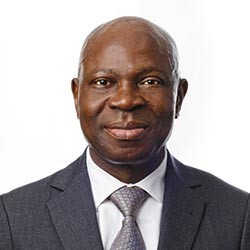Global Food Security Call to Action Ministerial Event Statement by Gilbert F. Houngbo President, IFAD
IFAD Asset Request Portlet
Asset Publisher
Global Food Security Call to Action Ministerial Event Statement by Gilbert F. Houngbo President, IFAD
18 May 2022Check against delivery
It is encouraging to see how the world has come together in this time of need.
An estimated 7 to 13 million additional people are expected to go hungry due to the impacts of the war in Ukraine. This is a level of suffering we must prevent.
And yet we must also not forget that hunger is always with us. Last year, more than 720 million children, women and men went hungry.
Clearly, we must respond promptly to the current crisis. But to achieve lasting food security, our immediate response must be balanced with coordinated, sustained, and longer-term investments in resilience.
Today we are dealing with Ukraine. Yesterday it was COVID. Tomorrow, it will be something else. And climate change is here to stay.
In this context, I welcome the leadership of those around this table in calling for a coordinated, global response that looks at both immediate and the longer-term needs.
Eighty per cent of the world’s poorest and most food insecure people live in the rural areas of developing countries.
The role of small-scale farmers is absolutely fundamental to what we have been discussing today. These farmers produce around one-third of our food calories.
Yet, too often, they are overlooked by policy makers.
I welcome the recent announcements by the IMF and the World Bank addressing global food systems. But we must make sure that investments reach those who need them most.
Small-scale producers are being affected by supply disruptions and higher prices for fuel, fertilizer, and other inputs. We are seeing this on the ground. It is a threat to their development gains, their livelihoods, and to the millions of people who depend on them for food.
The need for investment keeps growing at a time when ODA is increasingly constrained.
We also welcome the Resilience and Sustainability Trust launched by the IMF as a mechanism to re-channel SDRs to support long-term financing in low- and middle-income countries.
There is an opportunity to address the growing need by including food security as an area for investment.
For our part, last week IFAD launched the Crisis Response Initiative to scale up activities directly addressing the needs of rural communities hardest hit by this crisis. The Initiative will help protect the livelihoods of poor rural producers and build their resilience to this and future shocks – providing small-scale farmers in the poorest and most affected countries with access to essential agricultural inputs and the financing they need for the coming planting season.
It will build resilience by facilitating access to markets and market-related information, and investing in the infrastructure needed to reduce post-harvest losses.
IFAD stands ready and willing to expand the scope and scale of our response through the CRI.
We welcome the UN Secretary-General’s initiative to establish the Global Crisis Response Group, to which we are actively contributing. We are also supporting the AU/EU’s ‘Food & Agriculture Resilience Mission’ and working with the World Bank to lead on finance as a means of implementation following the Food Systems Summit.
In all of these initiatives, we are working to make sure our collective efforts converge to bring about real change.
We look forward to working with everyone here on a coordinated response that not only addresses immediate needs, but also looks to the future and prioritizes global food security in the long-term. This is the only way to lay a strong foundation so that small-scale producers can weather this and future shocks, and break the cycle of crisis, hunger and poverty.
